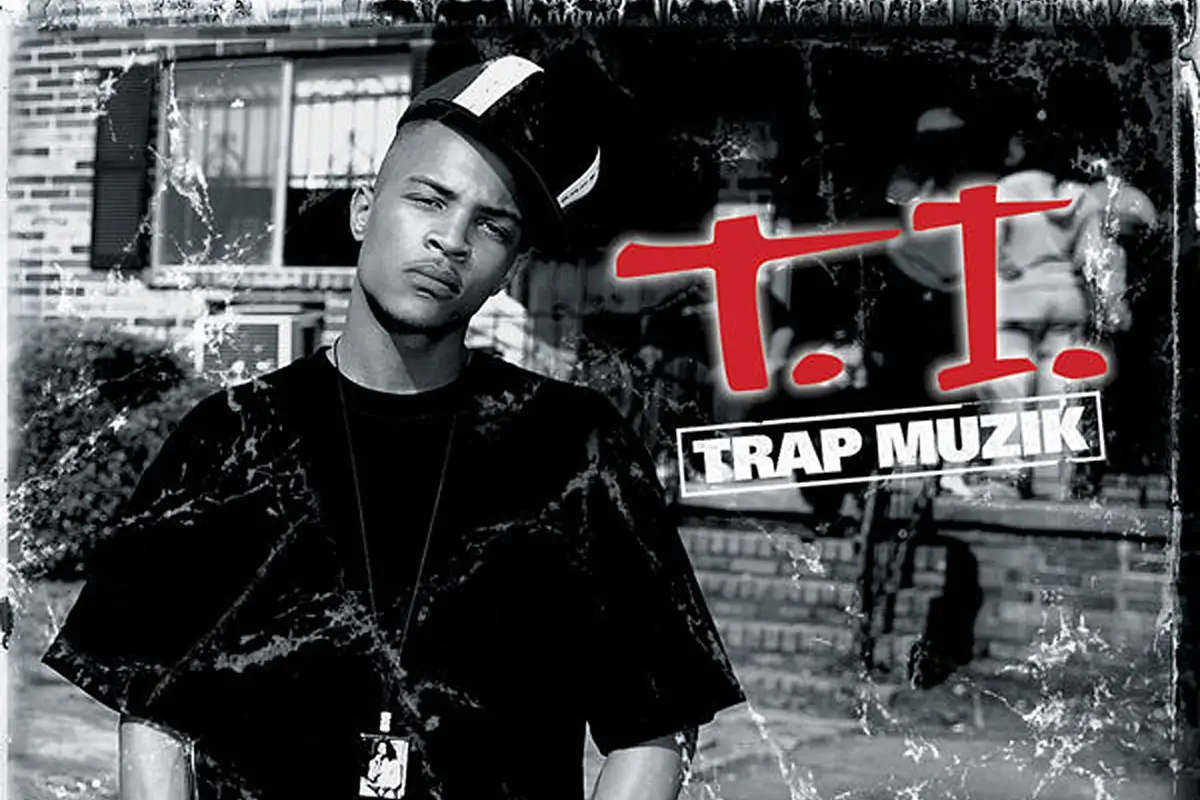
On the surface, hip hop in 2003 was all about the debut of 50 Cent’s Get Rich or Die Tryin’. But on the underground side, Trap Muzik, the second album from Atlanta’s son T.I. would revolutionize southern hip hop and solidify his claim to be its King.
Clifford “T.I.” Harris (aka Tip) made his first bold attempt for the title ‘King of the South’ on his debut album I’m Serious. The title track where he compared himself to Jay-Z was terribly produced by The Neptunes, making T.I.’s claim laughable at best. The album was also a commercial failure which caused Arista Records to drop the young Tip from the label, sending him back to his Bankhead home.
Instead of quitting, the cocky MC returned to the streets, relentlessly dropping a series of mixtapes titled In Da Streets Vol. 1-3. With the built-up buzz, T.I. showcased his commercial potential by delivering an impressive guest verse on Bonecrusher’s “Never Scared.” In the song, Tip’s passion comes through the car speakers when he yells, “I’m a Bankhead n***a, I’ll take yo cookies!” Now with leverage, T.I. and business partner Jason Geter orchestrated a joint-venture deal with his label Grand Hustle and the label that once dropped him. The second chance made T.I. more motivated than ever, and he was prepared to prove it with his upcoming sophomore work Trap Muzik.

T.I. released his second album on August 19, 2003, and it was a transformative, genius-level work of art. A complete 180 from his debut album, I’m Serious, T.I. unapologetically went against the current trend of using popular Pharrell-sounding beats and instead went deeper into the Southern, bass-heavy, street music that made him. This second approach delivered a more biographical perspective of Tip as a human being who lived an imperfect life of drug dealing, children by multiple women, and issues with his father. T.I.’s description of the album was, “It’s information for those who can’t relate and inspiration for those who can.”
The lead single, “24s”, produced by DJ Toomp, is an infectious, trap-boy, marching-band, drum anthem. “Be Easy” blends piano with a ticking sound that compliments Tip’s wordplay so well it’s hard to remember he’s rapping about murder. Rapper/producer David Banner is the wizard behind the organ-riff hit “Rubber Band Man”, where T.I. reps his drug-dealer past (hence wearing rubber bands around the wrist). The video had celebrity cameos from Michael Vick, Usher, Jazze Pha, and Diddy—dancing, of course.

The B-sides of Trap Muzik also add to the album’s legacy with heartbreaking songs such as “I Still Love You”, where Tip apologizes to his children and their mothers and admits his mistakes. “T.I. vs. T.I.P.” is a lyrical display of the MC’s split personality, a battle between maturity and when keeping it real goes wrong. About “No More Talk”, T.I. says, “It’s how I feel about the industry right now, how talent is being compromised. Art is being compromised for the almighty dollar.”The Kanye West-produced “Doin’ My Job” is where T.I.’s conversational flow shines as he pleads to a neighborhood lady not to call the cops because he’s just trying to make a living.
The brilliance of T.I.’s Trap Muzik is its authenticity in expressing the highs and lows of trap life without being preachy or braggadocious but still entertaining. The lyricism is elite in storytelling and wordplay without complicated rhyming metaphors. Each song’s message is clear enough for a grandparent, parent, and even a child to understand. The album’s imprint legitimizes T.I.’s claim as King of the South, and its legacy created the groundwork for artists such as Jeezy, Gucci Mane, and Future to follow.



